The Black Swan: The Impact of the Highly Improbable
Nassim Nicholas Taleb is a maverick economist, and his intended audience for The Black Swan is investment professionals. As it happens, the lessons that Taleb intends for practitioners of "the dismal science" are also applicable for mental health professionals involved in risk assessment. Both investment and mental health professionals routinely forecast risk and often suffer the consequences of unpredicted adverse outcomes. Both also find that their ability to predict outcomes can be undermined by the same sets of incorrect assumptions.
Taleb defines a "black swan" by three attributes. First, it has a very low base rate occurrence. Second, it carries an extreme impact. Third, after the event a narrative is constructed that creates a false sense that the outcome could have been predicted and therefore prevented. Although Taleb's case examples are often economic or political in nature (the events of September 11, 2001, for example), it is not difficult to generate a list of black swans from within our own profession. School shootings, violence by individuals with no history of violence, and escapes from extremely secure forensic settings may all be black swans. I am reminded of two tragic events at a forensic hospital wherein two patients choked to death on pancakes within a month of each other. The base rate for an otherwise physically uncompromised person's dying from choking on a pancake is astronomically low; nonetheless pancakes were crêpe non grata and were not served in the institution for well over a decade. In retrospect these events may be explained, but it is rarely recognized that they are often fundamentally unpredictable and are unlikely to recur in a similar manner. The resources expended in preventing the recurrence of such an event can deplete financial resources or cause unnecessary abridgement of civil liberties.
After defining the problem, Taleb lays bare the assumptions that underlie our misperceptions of the unpredictable, defines gray swans (which are somewhat predictable low base rate events), and gives thoughtful commentary that may help clinicians in understanding when and how to make predictions. Ironically, Taleb's points are all well known by academic psychologists but are generally ignored by practitioners. It has been known since the early 1980s that unstructured clinical judgment predicts adverse outcomes at a rate below chance. Whereas actuarial and structured clinical judgment schemes are demonstrated to greatly improve predictive accuracy, unstructured clinical judgment remains the most common method of forecasting risk.
The Black Swan is an interesting and helpful book, but it is not without shortcomings. Taleb is an engaging writer, but in the latter part of the book his literary voice at times crosses the line from knowing to smug. In addition the book moves from general (and useful) observations about risk in the first two parts of the book to arcane pontification irrelevant to clinicians in the last part of the book. Nonetheless, Taleb's sensibilities as an economist offer a fresh perspective on problems faced by mental health practitioners, particularly those who work in public-sector or forensic settings, and The Black Swan is a worthwhile and enjoyable book for those involved in risk prediction.
The reviewer reports no competing interests.



